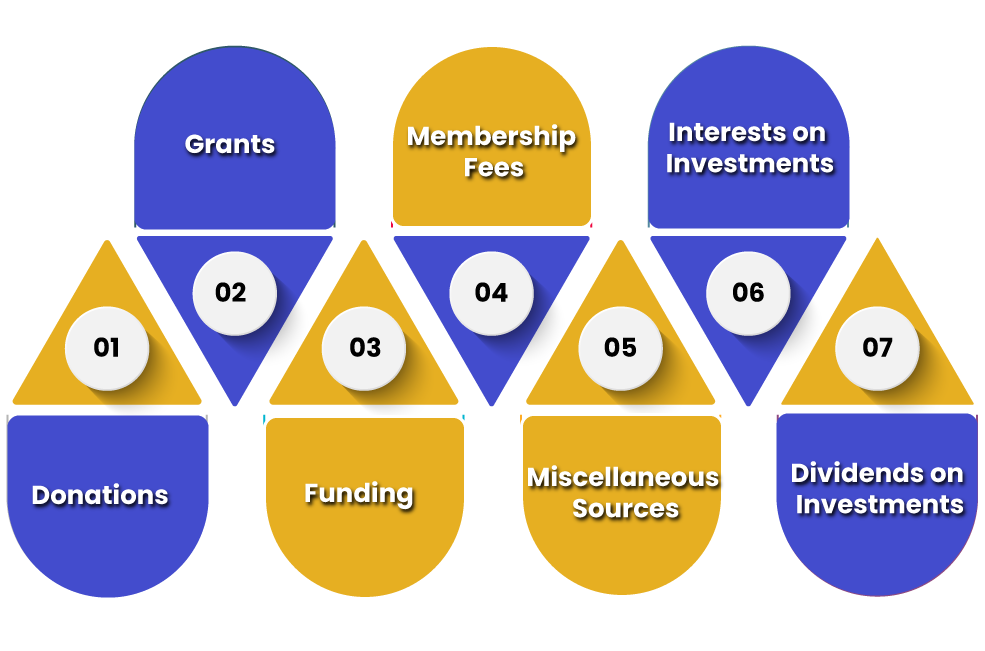What are the Features and Forms to Approach NGO Registration in India?

Shivani Jain | Updated: Jan 30, 2021 | Category: NGO
NGO or Non-Governmental Organisation denotes an independent entity, which works with an aim to promote social welfare. That means one of the main features of NGO Registration in India is to work without the motive to earn profits. Further, it shall be significant to note that just like any other business structure there is set of procedure, requirements, and forms of NGO Registration as well.
In this blog, we will discuss about the features of NGO Registration and forms to obtain NGO Registration in India.
Table of Contents
Concept of Non-Governmental Organisation
The term NGO or Non-Governmental Organisation denotes a business structure that works for an objective based on social welfare. Such an entity does not distribute profits to its members. Further, the main source of revenue for this business format are as follows:

- Donations;
- Grants;
- Funding;
- Membership Fees;
- Miscellaneous Sources;
- Interests on Investments;
- Dividends on Investments;
Furthermore, in India, the different types of NGOs prevalent are as follows:
- Trust Registration under the provisions of the Indian Trust Act 1882;
- Society Registration under the provisions of the Societies Registration Act 1860;
- Section 8 Company under the provisions of the Companies Act 2013;
Features of NGO Registration in India
The key features of NGO Registration in India are as follows:
- NGO is a self-governed body;
- It is managed by a managing body or trustees;
- NGOs are non-profit making organizations;
- It works for an objective, which will be based on social welfare;
- It never distributes a dividend to its members;
- The key sources of income or revenue for an NGO are donations, grants, and membership fees;
Forms of NGO Registration
The different required forms of NGO Registration in India are as follows:
|
Purpose of Form |
Form Numbers |
|
Approval of the Name |
INC 1 |
|
Declaration |
INC 8 |
|
Affidavit form each of the proposed directors |
INC 9 |
|
Application for Licence |
INC 12 |
|
Memorandum Of Association(MOA) |
INC 13 |
|
Declaration Note from practising CAs |
INC 14 |
|
Declaration Note from every individual who is willing to apply |
INC 15 |
|
To obtain Section 8 Company License |
INC 16 |
|
Statement of Affairs concerning Registered Office |
INC 22 |
|
The consensus of all Proposed Directors |
DIR 2 |
|
Application to acquire DIN (Director Identification Number) |
DIR 3 |
|
Appointment of Directors |
DIR 12 |
Different Types of NGO Registration Prevalent in India
The different types of NGO Registration prevalent in India are as follows:
Trust
The term “Trust” denotes a transfer of property by the owner to some other person, on whom the owner has faith and confidence. Such a transfer is always for the benefit of a third person. The party involved in the formation of trust are Author/ Settlor/ Trustor (Owner), Trustee (Second Party), and Beneficiary (Third Person). The process to obtain Trust Registration in India is governed by the provisions of the Trust Registration Act 1882.
The two different types of Trust prevalent in India are Private Trust and Public Trust.
Society
The term “Society” denotes a company or an AOP (Association of Persons), who join hands to work together on a Mutual basis. Further, the objectives of society must relate to either of fields, such as Art, Education, Religion, Music, Culture, and Sport etc. It shall be significant to note that just like trust, society works on a non profit basis as well.
A minimum of seven members are needed to obtain Society Registration under the provisions of the Societies Registration Act 1860.
Based on the provisions of section 20 of the Societies Registration Act 1860, an entity can obtain societies registration from either of the following types:
- Charitable Societies;
- Society for the Maintenance of Libraries;
- Funding used for Charitable Assistance;
- Societies for boosting Science, Culture, and Fine Arts;
- Society working for the Diffusion of Political Education;
- Military Orphan Fund Centres;
- Collections of the Innate History Instruments, etc;
- Societies formed at the General Presidencies of India;
- Designs;
- Public Museum and Galleries of Arts and Paintings;
- Mechanical and Philosophical Inventions;
Section 8 Company
The term “Section 8 Company” denotes a business entity registered under the provisions of the Companies Act 2013[1]. Such an entity works as an NPO (Non-Profit Organisation) with an aim to promote Commerce, Education, Arts, Charity, Environment Protection, Social Welfare, Science, Research, Religion, etc.
It shall be significant to state that the income generated by a section 8 company can only be used in the fulfilment of objectives. That means the members of a section 8 company are not eligible for any dividend.
Also, it shall be relevant to take into note that if a section 8 company fails to achieve its objective, then, in that case, the Central Government might ask the same to wind up its operations.
Also, Read: What is the Procedure for Registration Under 12A and 80G for NGOs
Documents Required for NGO Registration in India
The different set of documents required to obtain NGO Registration in India are as follows:
Trust
The documents required to obtain Trust Registration in India are as follows:
- Identity Proofs of the Trustor;
- Address Proof of the Registered Office;
- A copy of the duly stamped Trust Deed;
- NOC (No Objection Certificate) from the Landlord;
- Latest passport sized photographs of the parties involved;
Society
The documents required to obtain Society Registration in India are as follows:
- Name of the proposed society;
- A copy of the Memorandum of Association of the society;
- A copy of the Bye Laws of the Society;
- Covering Letter with the Request to Register the proposed Society under the law;
- List of all the Members of the Society;
- Affidavits of the Office Bearers;
- Residential Proof for all the Members;
- Address Proof of the Registered Address;
- NOC (No Objection Certificate) from the Landlord;
Section 8 Company
The documents required to obtain Section 8 Registration in India are as follows:
- Identity Proofs of all the Promoters and Directors;
- Address Proof of the Registered Office;
- Utility Bills of the Registered Office;
- Latest Passport Sized Photographs for all the Promoters and Directors;
- Duly stamped Rent Agreement or Lease Agreement for the Registered Office, in case the same is on rent;
- A copy of the Sale Deed in case the place being used as Registered Office is self owned;
- NOC (Non-Objection Certificate) from the Registered Office;
- Form DIR 2 as the Consent to Act;
- Basic Details of all the proposed Directors and Promoters;
Procedure to Obtain NGO Registration in India
The steps involved in the process to obtain NGO Registration in India are as follows:
Trust
The steps involved in the process to obtain Trust Registration in India are as follows:
- In the first step, the applicant needs to select an appropriate name for the trust;
- Now, decide the Authors and Trustees of the trust;
- In the next step, draft the MOA (Memorandum of Association) of the Trust;
- After that, prepare the Trust Deed on a Judicial Stamp Paper;
- Now, submit the drafted Trust Deed to the Registrar;
- Lastly, acquire the Certificate of Trust Registration from Registrar;
Society
The steps involved in the process to obtain Society Registration in India are as follows:
- Firstly, select a name of unique character for the society;
- Now, draft an MOA (Memorandum of Association) for the society;
- After that, acquire all the necessary documents;
- Submit the documents with the Registrar, together with the fees prescribed;
Section 8 Company
The steps involved in the process to obtain Section 8 Company Registration in India are as follows:
- File an application to file Form SPICe+ form for Name Approval;
- Acquire DIN and DSC for the proposed Directors;
- Draft the MOA (Memorandum of Association) and AOA (Articles of Association) of the company;
- File the SPICe+ form for obtaining NGO Registration in India as a Section 8 Company;
Conclusion
In a nutshell, starting an NGO in India is not that tough and back breaking task if all the documents and records needed are available with the applicant well in advance. The main aim behind the formation of an NGO in India is to work for the betterment of the society, i.e., Social Welfare.
At Swarit Advisors, our team of proficient experts are always there to cater all your dilemma and doubts, and will assist you in the process of obtaining NGO Registration in a hassle free manner.
Also, Read: Know the Complete Difference between Non- Profit Organization and an NGO















